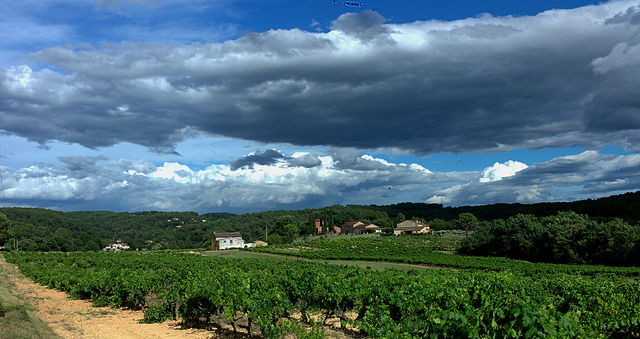We go to Provence every Summer. We used to fly and rent cars, but a few years ago decided that it would be more fun to take our own car and drive down slowly, taking our time, keeping off autoroutes, staying in small hotels and generally decompressing, until by the time we get to Arles, it feels as though we’ve never been away. France is a staggeringly beautiful country and driving south through its heart is like watching an absorbing road movie, as the landscape, topography, architecture and climate changes.
This year, driving north on our way home, we started out one morning from our hotel in the countryside near Lyon and drove for five hours to northern Burgundy without leaving roads that had been built by the Romans nearly two millennia ago. You can’t travel in France — especially in Provence, but also elsewhere — without being struck by the evidence of the astonishing reach and achievements of the Roman empire. The road network is the example that strikes me — more than the viaducts, coliseums, arenas, theatres and temples that impress others (for example, the incomparable Ina Caro). For not only is the modern French road system often built on the roads the Romans built, but we still make roads everywhere using the same basic formulae that they laid down.
But then comes the question that has preoccupied historians from Edward Gibbon to Mary Beard: how could an empire that accomplished all this fall apart? For fall apart it did. From which thought it was just a short step to brooding on the current state of the American republic and its associated empire. It’s impossible to watch what has been happening over there, not just in the current election campaign but in the last decade or two as the country’s politics became steadily more dysfunctional, and not ask if the country might be entering a period of chronic decline.
After all, its infrastructure is decaying — to the point where some people think that that fact explains Amazon’s long-term drone-delivery strategy: the company wants to take to the skies rather than relying on a decrepit road system. And although the US remains a superpower in military terms, the RAND Corporation recently released a study arguing that “improving Chinese military capabilities challenge the assumption that the United States would emerge an early and decisive victor in a war with China. The report noted that the advanced strike capabilities of each side, combined with the shrinking of the military gap between them, could make such a war intense, highly destructive, and yet protracted.”
Now I know too that this decline-of-the-American-empire idea is a recurring journalistic trope. (Gore Vidal was always going on about it.) It’s impossible to know if the country is indeed on the skids, and there are lots of reasons (including the power of its transnational corporations and the resulting ‘soft power’ that flows from them, its mastery of electronic surveillance and of new military technologies and the global system of alliances that its post-war diplomacy created) for thinking that its time hasn’t come. But as the election campaign grinds on there’s that nagging thought about how great institutions rot from within. After all, it was dysfunctional politics that ultimately did for the Romans. In the space of a hundred years Rome was transformed from a Republic with democratic institutions into an empire under the control of one man, Augustus.

